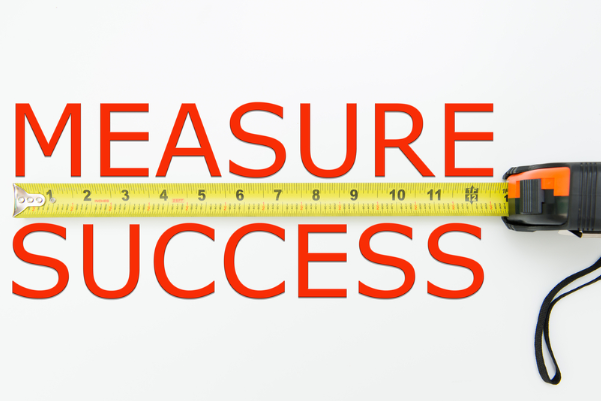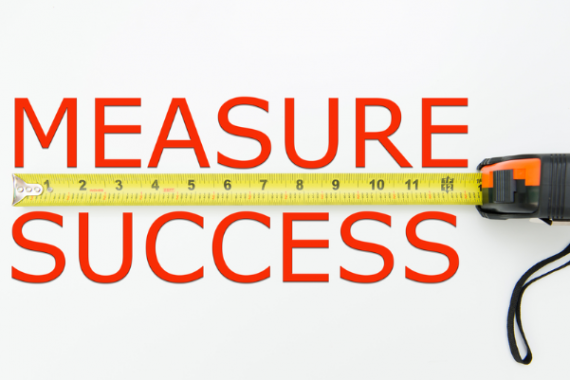A few years ago while talking to an editor, they told the story of an author who was never satisfied (not revealing the name of course). If this author’s latest book sold 50,000 copies. the author wondered why the publisher didn’t sell 60,000. And if it sold 60,000, why didn’t it sell 75,000? The author was constantly pushing for more and was incapable of celebrating success in any form.
Note the title of this post. I’m writing about measuring success, not defining it. To measure is to “estimate or assess the extent, quality, value, or effect of (something).” To define is to “state or describe exactly the nature, scope, or meaning of.”
[For some people, this may be only a matter of semantics; but it should be seen as the difference between setting a qualitative or a quantitative criteria for success.]
When it comes to book sales, many authors have written openly of their own measurement by using numbers and charts. Some even reveal how much money they’ve made. Following these claims can cause a range of emotions from being enlightened, debilitated, or simply frustrated.
I understand the desire to have some objective standard by which we can measure whether or not our efforts are successful. It is a natural instinct. I tried to answer a common question in the post “What Are Average Book Sales?” But it is still only one measure.
In one way, the question “how do you measure success?” is a wise one. It helps to set realistic expectations.
In another way it is unwise because it can end up inside the dangerous game called Comparison. I’ve talked to depressed authors who are wounded by numbers. I’ve talked to angry authors who are incensed by a perceived lack of effort by their publisher. I’ve talked to highly frustrated authors who wonder if it is worth it all.
Ultimately, the quest to know such information is an attempt to define success for the individual author, not measure it. I propose that one must measure before defining. If you can measure it, you can define it. As long as you know what “it” is.
__________
If you can measure it, you can define it.
As long as you know what “it” is.
__________
I think success in book publishing has at least two measurements.
One is yours. The one you define for yourself and your circumstances.
The other is determined by others when looking at your book, either by reading it (an evaluation of content quality), looking at it (an evaluation of production quality), or by evaluating data (sales numbers or market penetration).
The general market tends to both measure and define success based on how much money the author makes or how many copies the book sells.
The Christian market tends to measure success based on the impact of the material on someone’s life. (At least we can hope that is how they measure success.)
I’m aware that the above generalization is simplistic and almost naive, but one cannot deny the sentiment.
At the very least, the Christian author would like to have both. They want their book to both make money and be one that changes lives.
I hope you would agree that impact and changed lives are of primary importance to every writer who is a Christian. To create stories (novels) that reach hearts through the power of story. To write nonfiction that inspires, persuades, encourages, and challenges hearts and minds.
Any discussion of sales numbers should become secondary.
The letters our clients have received from readers include messages from those who chose life over suicide, life over abortion, marriage over divorce, certainty over doubt, reconciliation over stubbornness, hope over despair, a life with Christ over a life of emptiness—because of a book they read.
There is power in words, written and spoken. They can be for good or for evil. Strive for your words to be measured by good. Let them not be banal or benign, but choose the words that challenge and change the lives of those who will read them.




 Fun Fridays – December 6, 2019
Fun Fridays – December 6, 2019

Steve,
Thanks for this fascinating post. I agree that changed lives is a measure of success but hopefully that is combined with book sales. Next week, my book 10 Publishing Myths releases and is focused on helping authors have realistic expectations and also taking action themselves in this process (something admittedly I didn’t do for years but do now).
Alice Crider told me I was missing the 11th Myth so I decided to write this chapter and give it away at: Get the 11th Publishing Myth FREE Ebook. Hope it helps some of your readers in this area of success.
Terry
Here’s my measure of success,
and I hope it’s not untoward,
but those who know me, they’d correctly guess,
it’s “what can I afford?”
My aim’s a brand-new Gulfstream
with that ‘fresh new bizjet’ smell,
and the calculus of dreams
comes from how many books I sell.
So I will plug the with no shame,
everywhere that I can reach.
The world will thereby now my name
and come to hear me preach.
And I’ll fly off, when I am done,
to my mansion in Caribbean sun.
Definitely a state of mind that I pray is lead by the spirit. For me, did God stamp his will on it? If yes, the. “Amen” & thank you Jesus! If it effects 1 soul to the leading of salvation… how could the 1 not be counted as success? I know the 1 means enough to Jesus to go back for… with that in mind I have my perspective of success.
Hi Steve,
What a wonderful reminder, especially during this season. My debut novel, ALL IN, for which I owe no small thanks to Terry Whalin, released from MJP in August. The book has found an audience among women inmates in Texas (my home state), some of whom are on death row. This novel doesn’t follow the “rules” typically associated with Christian Fiction as a genre, and maybe that’s why it resonates with these women and other Christians who aren’t necessarily immersed in church culture. Engaging these readers with a story about friendship, hope, and Jesus is one measure of success I’ve tried to keep in mind, especially when sales are slow. Every reader is important, as important as the one sheep you leave the ninety-nine to find. I try to remind myself of that too.
There’s a book titled The Gift: Creativity and the Artist in the Modern World by Lewis Hyde. It isn’t a Christian book per se, but it explores the difference between gift economies and barter economies. Of course, God’s kingdom is very much a gift economy, so that makes the The Gift a worthwhile read and a real paradigm changer for measuring success.
Lisa
lksimonds.com
An author’s success depends on how the readers view what you’ve published. My measure of success is based strictly on that. How much I make on my books is secondary, and it is no one’s business but my own.
Since I view my work as a business, I treat it the same way I did when I worked outside my home. That is, I never discuss my salary with anyone except my tax consultant. When did authors start comparing their income from books with what others earn? A long time ago, I learned that comparing your income with others performing the same task always produced hard feelings and discouragement for someone.
Success is determined by your accomplishment in doing what you set out to do. If you’ve written a story, poem, memoir, etc., and someone has read it and said they enjoyed it, got a blessing from it, learned something from it, etc., what more do you need to say you are successful?
Measure your success by the accomplishment of what God told you to do, not by comparison with other writers. My opinion, take it or leave it.
Great post, Steve.
I started having dreams about heaven, the Millennium, several years back. I came to a point where I could do nothing else but write it down. It turned into a book. I am excited every time I listen to it.
I wasn’t thinking about marketing the book. I haven’t done so yet. I just loved the story and how that it took me places that I plan to visit in the future.
When I was done with that novel, I thought I would try another one. It was completely different, but telling the story and writing it out was exciting. I loved that story just as much, so guess what I did?
I wrote a third one and fell in love with the story as much as I did the first two.
Since, I have decided to write a book of short stories, and am working on a sequel to my second novel. The sequel to the first novel will be rewritten once I get to heaven, I intend to live that one.
I don’t plan to stop writing even though the rest of my days might be short in this world, and I will remain as poor then as I am now. I never started the first one intending to get rich. So, I guess success to me is when at the end of the day, I can read, or listen to my own stories and get carried away in them.
That doesn’t mean that I won’t try to sell my books, sales or no sales will not deter me from writing more.
I hadn’t considered myself an author and still don’t, because I am not sure what constitutes an author.
PS: One thing I noticed about agents and authors is that one is not necessarily good at the other?
Steve,
This post grabbed my attention and reminded me that success is more than statistics. As an unpublished Christian writer, the desire to change hearts with my story drove my writing for a long time. However, as time passes, doubts emerge and erode a sense of purpose essential for continuing this journey. When I stand before the throne, will the Lord consider my writing time well-spent for the glory of His kingdom? Because my work hasn’t advanced to a broader audience, are my time and talents better used elsewhere?
At times, doubts like these make writing feel like self-indulgence. And yet, I can’t quit. The compunction to write nags at me stronger than a craving for chocolate (and I’m a raging chocoholic)—especially when I remember all the ways the Lord has encouraged me and pulled me closer to Him as I pursue this dream. Perhaps my work has not yet changed others’ hearts, but the Lord has undeniably used my writing journey to strengthen my own faith.
Though I can’t yet measure or celebrate my work’s effect on others, I can rejoice in the Lord’s success in growing my heart as I write it. May we always consider His purpose and success in our endeavors whenever we’re discouraged by statistics.
~KJ
KJ,
Have you considered that since you see your faith being strengthened, your writing time is already well-spent for God’s Kingdom? Because God has used your writing to do that, if God wants your writing to go to a broader audience, and in God’s timing, it will go to that audience.
It seems God uses the writing process to first minister to me, then others.
Spot on, Steve! In the last week since my latest released, I got a taste of a success that goes far beyond numbers and dollars. I write Roman-era adventures with a romance woven through where at least one character wrestles with what to do with the Christian faith. That makes them fit the Amazon ancient world historical romance category, and on a really good sales day, my books can crack the top 100 there. Hope Unchained just did that for a few days in the last 2 weeks, and that’s where the success came from. Someone who normally reads secular romance (100 a year!) and averages a 3.46 rating at Goodreads read mine and gave it a 3. It was the only CF title in that 100, and I am thrilled to the core that a story where the two most important character arcs are pagans deciding to follow Jesus and the first lip kiss is on the last page would get three stars from someone who doesn’t normally read Christian fiction. Who knows what seed was planted? So a sales number of 1 might be my greatest success this year, maybe my greatest since my first book released in late 2016. Not what a big publisher would celebrate, but exactly why I’m doing what I do.
That is really awesome, Carol! I agree….who knows what seeds were planted in that reader’s life.
The measurement of the success one experiences seems commensurate with the seasons of growth one also experiences.
So true—“impact and changed lives are of primary importance.” I love this. Good to hear today!
Extremely relevant personal challenge to me, Steve! My academic research has been published in professional journals. My dissertation has been cited in more than 100 publications. First-person articles have been published in Guideposts and an organization journal. I write well-researched articles for my city’s newspaper’s weekly local history column and often receive highly affirming feedback. My FB web site Seeking Siloam Springs, devoted to the history of a town that once thrived in our county but was dismantled in1943 so the land could become a state park, that I hope will supply information and sales for a book on the topic, has more than 550 followers–many who interact regularly, and it gains more every time I post.
But I’ve written a dozen books in several different genres and none of them are published, and I confess, that fact makes me feel unsuccessful as a writer. A couple of them required intensive research and several years to write. I poured so much into writing them I just want people to read them and be edified, informed, and challenged as they are entertained by a good story. I think I need to address the difference between defining success and measuring success in the way you proposed and get busy finding a good agent! Thanks! So often this blog is like an honest friend who tells me what I need to hear.